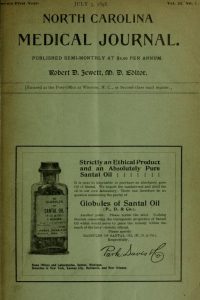~Courtesy Dawne Lucas, Special Collections Librarian, Wilson Special Collections Library at the University of North Carolina at Chapel Hill
Join us on Tuesday, April 16 at 12:00 p.m. for our last Bullitt History of Medicine Club lecture of the Spring 2019 semester. The lecture will take place in the Health Sciences Library, Room 527. Sandwiches will be provided.
Dr. Kurt Gilliland will present “Skeletons in our Closet: Anatomical Eponyms.”
While many eponyms are no longer taught or used in medicine, certain structures in anatomy, embryology, histology, and neuroscience will always be better known by their eponyms than by their descriptive names. The scientists and physicians after whom structures are named remind us of the fascinating history of medicine.
Kurt Gilliland is Associate Dean of Curriculum and Associate Professor, Department of Cell Biology and Physiology for UNC School of Medicine, and the co-author of the 2010 bookAnatomists and Eponyms: The Spirit of Anatomy Past.He teaches anatomy and directs cell biology and histology in several courses for 1st-year and 2nd-year medical students. His educational scholarship evaluates curriculum interventions, and his basic research focuses on the development of the lens of the eye and cataract development. Recent awards include the Academy of Educators Educational Scholarship Award (2018) and the Academy of Educators Foundation Phase Teaching Award (2017).







